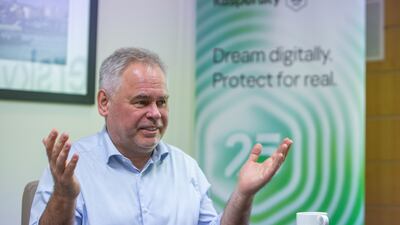The number of "highly professional" cyber-criminal gangs has surged to about 900 from about a dozen five years ago, with most engaged in state-sponsored espionage, the chief executive of cyber-security company Kaspersky has said.
The spike in this specific activity and in wider cyber crime highlighted the increasing need for organisations to secure their digital infrastructure by making them "unhackable", Eugene Kaspersky told The National at Gitex Technology Week in Dubai.
"In 2017, there were only very few highly professional cyber-criminal gangs that existed," he said.
"Now we are monitoring about 900 professional projects, tools that have branched or forked from the same source code ... and we don't know who's behind them."
Mr Kaspersky added that about 80 per cent of these activities are state sponsored, while the rest are involved mostly in ransomware and financial crime.
State-sponsored cyber attacks are those carried out by criminals directly linked to or sponsored by a nation state. Their main aims are gathering intelligence, exploiting vulnerabilities in critical infrastructure and extortion.
Among the segments at risk are public services and utilities, companies with active government contracts, high-value companies and businesses that handle sensitive information.
There have been several "significant" state-sponsored cyber attacks or attempts in the past couple of years, with targets including telecommunications companies, European Commission members and South-East Asian governments, according to data from the Centre for Strategic and International Studies.
While there is no talent shortage in cyber-security companies to fight bad actors, there is still a lack of action within those organisations using their solutions to enhance their system protection, Mr Kaspersky said.
"To develop the scaleable technology like developing new architecture security products or bringing in new ideas, I don’t see a problem," he said.
"But for companies, they can’t find enough cyber-security engineers to implement new systems and ideas — and that’s the problem."
Mr Kaspersky suggested two strategies for organisations to protect their systems: a short-term plan involves applying threat intelligence, several layers of protection and making decisions on machine learning.
The longer-term method involves redesigning the architecture of cyber security systems and building it on principles of cyber immunity or implementing techniques to protect systems from all fronts.
"It's much, much more than a sandbox. This is the only way to make the system unhackable," he said, referring to the development method of having all tools in an isolated environment without affecting the actual system.
"The main thing to do right now is to protect critical infrastructure, then immunise it."
He also said that countries in the Middle East have been taking strides to advance their cyber-security infrastructure and recognised the importance of leveraging local talent to add another layer to safeguarding systems.
"It’s changing so fast. There’s much more investment in cyber security, and there are more talented people," he said, adding that the UAE and Saudi Arabia were markets that stood out.
"Localising talent must be done to protect and keep critical infrastructure under control. The localisation of data is also important, so states understand the importance of their data and its cyber security," he said.
"If it's critical infrastructure, it has to be local people ... national security doesn’t like foreigners who will have access to that."
If it's critical infrastructure, it has to be local people ... national security doesn’t like foreigners who will have access to that
Eugene Kaspersky,
chief executive of Kaspersky Lab
Mr Kaspersky also said that the company was willing to open a new data transparency centre, having opened nine of them since 2018. But this would depend on the requirements of the local market, and he hinted that the Middle East is a candidate.
"If there is a request from a local government, yes, we will. It will depend on the requirements. If it’s needed and they ask us to, we can do it."
On cryptocurrencies, Mr Kaspersky said it is a "great innovation, but the world is not ready for that right now" because of its smaller scale compared to the current financial sector.
"It’s an alternative financial system, but it’s not comparable with the existing banking system because it's much smaller," he said.
"I believe that in the future, most crypto-based financial systems will be one among the global systems."
The specs
Engine: 2.0-litre 4cyl turbo
Power: 261hp at 5,500rpm
Torque: 405Nm at 1,750-3,500rpm
Transmission: 9-speed auto
Fuel consumption: 6.9L/100km
On sale: Now
Price: From Dh117,059
Infiniti QX80 specs
Engine: twin-turbocharged 3.5-liter V6
Power: 450hp
Torque: 700Nm
Price: From Dh450,000, Autograph model from Dh510,000
Available: Now
More from Neighbourhood Watch
Expo details
Expo 2020 Dubai will be the first World Expo to be held in the Middle East, Africa and South Asia
The world fair will run for six months from October 20, 2020 to April 10, 2021.
It is expected to attract 25 million visits
Some 70 per cent visitors are projected to come from outside the UAE, the largest proportion of international visitors in the 167-year history of World Expos.
More than 30,000 volunteers are required for Expo 2020
The site covers a total of 4.38 sqkm, including a 2 sqkm gated area
It is located adjacent to Al Maktoum International Airport in Dubai South
Killing of Qassem Suleimani
How The Debt Panel's advice helped readers in 2019
December 11: 'My husband died, so what happens to the Dh240,000 he owes in the UAE?'
JL, a housewife from India, wrote to us about her husband, who died earlier this month. He left behind an outstanding loan of Dh240,000 and she was hoping to pay it off with an insurance policy he had taken out. She also wanted to recover some of her husband’s end-of-service liabilities to help support her and her son.
“I have no words to thank you for helping me out,” she wrote to The Debt Panel after receiving the panellists' comments. “The advice has given me an idea of the present status of the loan and how to take it up further. I will draft a letter and send it to the email ID on the bank’s website along with the death certificate. I hope and pray to find a way out of this.”
November 26: ‘I owe Dh100,000 because my employer has not paid me for a year’
SL, a financial services employee from India, left the UAE in June after quitting his job because his employer had not paid him since November 2018. He owes Dh103,800 on four debts and was told by the panellists he may be able to use the insolvency law to solve his issue.
SL thanked the panellists for their efforts. "Indeed, I have some clarity on the consequence of the case and the next steps to take regarding my situation," he says. "Hopefully, I will be able to provide a positive testimony soon."
October 15: 'I lost my job and left the UAE owing Dh71,000. Can I return?'
MS, an energy sector employee from South Africa, left the UAE in August after losing his Dh12,000 job. He was struggling to meet the repayments while securing a new position in the UAE and feared he would be detained if he returned. He has now secured a new job and will return to the Emirates this month.
“The insolvency law is indeed a relief to hear,” he says. "I will not apply for insolvency at this stage. I have been able to pay something towards my loan and credit card. As it stands, I only have a one-month deficit, which I will be able to recover by the end of December."
Stuck in a job without a pay rise? Here's what to do
Chris Greaves, the managing director of Hays Gulf Region, says those without a pay rise for an extended period must start asking questions – both of themselves and their employer.
“First, are they happy with that or do they want more?” he says. “Job-seeking is a time-consuming, frustrating and long-winded affair so are they prepared to put themselves through that rigmarole? Before they consider that, they must ask their employer what is happening.”
Most employees bring up pay rise queries at their annual performance appraisal and find out what the company has in store for them from a career perspective.
Those with no formal appraisal system, Mr Greaves says, should ask HR or their line manager for an assessment.
“You want to find out how they value your contribution and where your job could go,” he says. “You’ve got to be brave enough to ask some questions and if you don’t like the answers then you have to develop a strategy or change jobs if you are prepared to go through the job-seeking process.”
For those that do reach the salary negotiation with their current employer, Mr Greaves says there is no point in asking for less than 5 per cent.
“However, this can only really have any chance of success if you can identify where you add value to the business (preferably you can put a monetary value on it), or you can point to a sustained contribution above the call of duty or to other achievements you think your employer will value.”
Polarised public
31% in UK say BBC is biased to left-wing views
19% in UK say BBC is biased to right-wing views
19% in UK say BBC is not biased at all
Source: YouGov
Mohammed bin Zayed Majlis
The five pillars of Islam
Fight card
Preliminaries:
Nouredine Samir (UAE) v Sheroz Kholmirzav (UZB); Lucas Porst (SWE) v Ellis Barboza (GBR); Mouhmad Amine Alharar (MAR) v Mohammed Mardi (UAE); Ibrahim Bilal (UAE) v Spyro Besiri (GRE); Aslamjan Ortikov (UZB) v Joshua Ridgwell (GBR)
Main card:
Carlos Prates (BRA) v Dmitry Valent (BLR); Bobirjon Tagiev (UZB) v Valentin Thibaut (FRA); Arthur Meyer (FRA) v Hicham Moujtahid (BEL); Ines Es Salehy (BEL) v Myriame Djedidi (FRA); Craig Coakley (IRE) v Deniz Demirkapu (TUR); Artem Avanesov (ARM) v Badreddine Attif (MAR); Abdulvosid Buranov (RUS) v Akram Hamidi (FRA)
Title card:
Intercontinental Lightweight: Ilyass Habibali (UAE) v Angel Marquez (ESP)
Intercontinental Middleweight: Amine El Moatassime (UAE) v Francesco Iadanza (ITA)
Asian Featherweight: Zakaria El Jamari (UAE) v Phillip Delarmino (PHI)
UAE currency: the story behind the money in your pockets
Learn more about Qasr Al Hosn
In 2013, The National's History Project went beyond the walls to see what life was like living in Abu Dhabi's fabled fort:
The biog
Favourite films: Casablanca and Lawrence of Arabia
Favourite books: Start with Why by Simon Sinek and Good to be Great by Jim Collins
Favourite dish: Grilled fish
Inspiration: Sheikh Zayed's visionary leadership taught me to embrace new challenges.




